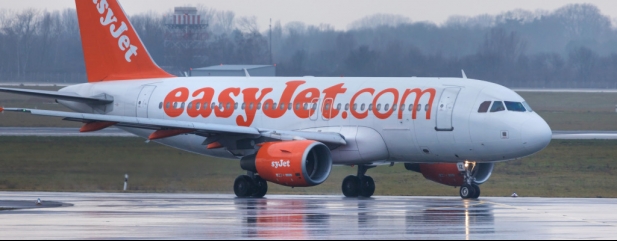Archived article
Please note that tax, investment, pension and ISA rules can change and the information and any views contained in this article may now be inaccurate.
EasyJet shares are underpricing the airline’s recovery potential

It’s perceived wisdom that ever since the Wright Brothers took to the skies over a century ago the airline industry hasn’t turned a profit. For every boom there has been a more severe bust which has wiped out earnings leaving the industry in net losses.
Having said that, until the arrival of the perfect storm in the form of Covid-19, EasyJet (EZJ) had posted a profit every year since it was founded in 1995, demonstrating the strength of its business model.
We believe, as the return of leisure travel accelerates over the course of the next 12 months, EasyJet is likely to return to profitable growth faster than anticipated and is being undervalued by the market.
LEANER AND FITTER
In the quarter from April to June last year, the firm’s entire fleet was grounded for all but two weeks. In the same quarter this year, capacity was still only 17% of 2019 levels due to on-off restrictions, but in the quarter to September it was 58% and this quarter it should be 70% of 2019 levels.
Due to UK travel restrictions, aircraft have been switched to its most popular European routes, increasing the airline’s presence in many markets in the process, and bookings for the next six months are already double year-ago levels.
In the three months to September headline losses were halved and operating cash flow turned positive. Cash burn has been significantly reduced and the firm expects to deliver structural cost savings of £500 million this year, of which almost half will be sustainable on an ongoing basis.
To bolster its balance sheet and give it flexibility to grow, it launched a £1.2 billion rights issue last month. The airline believes there will be ‘considerable opportunities’ to grow as legacy carriers restructure their short-haul businesses.
GREATER COMPETITION
In our view, the biggest threat to EasyJet’s recovery comes from its rivals. For decades, most airlines have only covered their costs flying tourists in economy class and have relied on business passengers to make the bulk of their profits.
When business travel came to a standstill during the pandemic, airlines around the world suspended their first class and business class services. Although business travel has tentatively returned, executives are increasingly opting to use private jets for short flights. And while the UK to US route has reopened, the lucrative long-haul business market is unlikely to ever return to the same size.
As a result, many European airlines have ripped out first class and business class seats and replaced them with ‘premium economy’, offering passengers more space at a higher price than the cheapest seats but a discount to business class.
‘Premium economy is the most profitable real estate on the aircraft, and the pandemic has reinforced that,’ says Finnair chief executive Topi Manner.
According to Lufthansa, premium economy generates 33% more revenue per square foot than economy and 6% more than business. It’s also more profitable than business because it’s cheaper to install and takes up less space.
THE WRONG PRICE
Even allowing for greater competition, we think EasyJet shares are under-pricing the company’s recovery potential. We aren’t looking at the price to earnings multiple – which is distorted due to a rise in the number of shares – but at the market’s low expectations for the next year.
The shares are priced for losses of more than £1 billion for the year just ended and only £88 million of pre-tax profits for the year to next September, against an average run-rate of £430 million to £440 million of profits in 2017/18 and 2018/19.
This seems odd to us as, while revenues for the year just ended are seen shrinking to £1.4 billion from around £6 billion pre-pandemic, for next year they are seen recovering to over £5 billion and by 2023 they are seen well above their historic average.
Based on these revenue forecasts and considering the effort the firm has made to reduce costs, we think earnings are likely to surprise to the upside.
A TEMPTING TARGET
We clearly aren’t the only ones who think the shares are mis-priced, as this summer the firm rebuffed a takeover bid, widely believed to be from low-cost rival Wizz Air (WIZZ).
EasyJet chief Johan Lundgren said he wasn’t against a deal in principle, but it needed ‘to be able to deliver value for shareholders and to deliver a reason to believe in a successful outcome’.
Ryanair (RYA) chief executive Michael O’Leary, never one to shun the limelight, was quick to stir the pot saying it would be ‘sensible’ for EasyJet and Wizz to merge.
However, we suspect British Airways, owned by Intercontinental Airlines (IAG), is a more likely suitor, and it is unlikely to get a better opportunity. The airline has just restarted operations from Gatwick, EasyJet’s main hub, and has been looking at options to starting its own low-cost operation.
Moreover, EasyJet founder Stelios Haji-Ioannou, who has had his differences with the current management, no longer owns a 25.4% blocking stake after refusing to take up his shares during the latest rights issue. The family’s stake is now just 15.3%, big but not big enough to block an approach.
Investing in EasyJet means having the stomach to cope with a share price that could experience wild swings up and down. However, for those comfortable with this situation, the stock looks like a screaming buy at the current price.
Important information:
These articles are provided by Shares magazine which is published by AJ Bell Media, a part of AJ Bell. Shares is not written by AJ Bell.
Shares is provided for your general information and use and is not a personal recommendation to invest. It is not intended to be relied upon by you in making or not making any investment decisions. The investments referred to in these articles will not be suitable for all investors. If in doubt please seek appropriate independent financial advice.
Investors acting on the information in these articles do so at their own risk and AJ Bell Media and its staff do not accept liability for losses suffered by investors as a result of their investment decisions.
Issue contents
Education
Feature
Great Ideas
- A costly TeamViewer error: hands up, we called this stock wrong
- ASML is still a core holding for investors despite big share price rally
- Bank of England prediction for rising insolvencies good for FRP
- Right time to own Ruffer as inflation pressures mount
- EasyJet shares are underpricing the airline’s recovery potential
- The fund that seeks to defend against inflation
Investment Trusts
Money Matters
News
- Entain’s silence on DraftKings takeover approach is puzzling
- IPOs still coming thick and fast despite some cancellations
- Knock-on effects from higher gas prices are wider than many think
- ASOS shareholders hope new CEO can revive share price growth
- Chubb’s $5.7bn Asian deal has positive read-across to Prudential

 magazine
magazine








